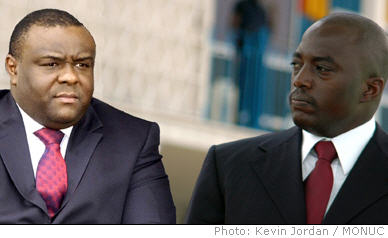Second round contenders Vice-President Jean-Pierre Bemba and President Joseph Kabila |
KINSHASA, 25 Sep 2006 (IRIN) - Senior aides to the two candidates running for president in the Democratic Republic of Congo (DRC) have agreed to make Kinshasa a weapons-free zone to ensure that the fighting that followed the first-round results in August is not repeated.
"This agreement seeks to reduce the risk of fighting in the city of Kinshasa so that the second round of elections can take place peacefully," according to the agreement signed on Friday by Samba Kauto, a senior security adviser to the incumbent president, Joseph Kabila, and François Muamba, representing presidential challenger Jean-Pierre Bemba.
The document states that the measures are designed to reassure the local population that it is safe to vote in the run-off election scheduled for 29 October.
After signing the agreement Muamba said: "The measures should be kept in place until results of the second round have been made public and even until the new elected government is installed."
International as well as government officials have expressed concern about the number of weapons circulating in Kinshasa. "This agreement focuses on Kinshasa because this is where there is a problem of the proliferation of arms," Jean-Tobbie Okala, spokesman for the United Nations Mission in the DRC (MONUC), said.
Officials who did not want to be quoted said most of the guns were in the hands of militia groups loyal to either Bemba or Kabila.
Friday's agreement was reached almost exactly a month after fighting between Kabila and Bemba's forces killed at least 23 people in Kinshasa.
Kabila and Bemba have now agreed to keep their troops in the barracks during the second round and to respect the weapons ban. The agreement says that to enforce the ban there would be "control, surveillance and verification mechanisms". However, it does not state who will enforce the ban although it does say that assistance will be sought from MONUC and the European Union force in the DRC, known as EUFOR.
Okala said the police will be the only national security force authorised to carry weapons.
However, it may be difficult to enforce the ban, particularly as the agreement does not allow for civilians to be searched. Observers have said armed groups might decide to don civilian clothes.
ei/dh/mw/oss
Related articles
- • European Union Sanctions Rwanda and M23 Officials over Congo Conflict (March 17, 2025)
- • Canada and Germany Impose Sanctions on Rwanda for Supporting M23 Rebels (March 4, 2025)
- • European Union Suspends Defence Consultations with Rwanda (February 24, 2025)
- • Felix Tshisekedi Sworn In as DR Congo President (January 24, 2019)
- • Constitutional Court Declares Tshisekedi Winner of Presidential Election (January 19, 2019)
- • Felix Tshisekedi Vows to Be the President of All Congolese (January 10, 2019)
- • Felix Tshisekedi Elected DR Congo President (January 10, 2019)
- • DR Congo Delays Results of December Election (January 6, 2019)
- • Jean-Pierre Bemba Returns to DR Congo (August 1, 2018)
- • At least 30 dead after massacres in Ituri (March 2, 2018)
- • Botswana Urges Joseph Kabila to Step Down (February 26, 2018)
- • No elections in DR Congo in December without electronic voting machines: INEC (February 13, 2018)
- • US Warns DR Congo Against Electronic Voting for Delayed Election (February 12, 2018)
- • Felix Tshisekedi accuses INEC of illegally prolonging Kabila's mandate (October 24, 2017)
- • DRC Seeks Arrest of Presidential Candidate Moise Katumbi (May 19, 2016)
- • Papa Wemba Is Buried in Kinshasa (May 4, 2016)
- • Papa Wemba Awarded Highest National Honor as Thousands Pay Tribute (May 2, 2016)
- • DR Congo reach final of African Nations Championship (February 3, 2016)
- • Political tensions 'running high' in DR Congo ahead of 2016 elections (October 7, 2015)
- • Rights Groups: DR Congo Must Free Pro-democracy Activists (April 13, 2015)
- • Police Open Fire on Crowd Protesting Election Law Change (January 19, 2015)
- • Denis Mukwege Wins Sakharov Prize 2014 (October 21, 2014)
- • Etienne Tshisekedi Evacuated to Belgium for Medical Treatment (August 16, 2014)
- • 15 dead in football match stampede in Kinshasa (May 12, 2014)
- • Kerry Calls on Kabila to Honor Constitution (May 4, 2014)
- • Kerry in DR Congo for Security Talks (May 3, 2014)
- • Security Council extends UN mission, intervention force in DR Congo for one year (March 28, 2014)
- • Death toll in Lake Albert boat accident rises to 108 people (March 24, 2014)
- • DR Congo Takes Chairmanship of COMESA at Summit in Kinshasa (February 26, 2014)
- • New DR Congo amnesty law welcomed by UN envoys (February 5, 2014)
Tags: |








